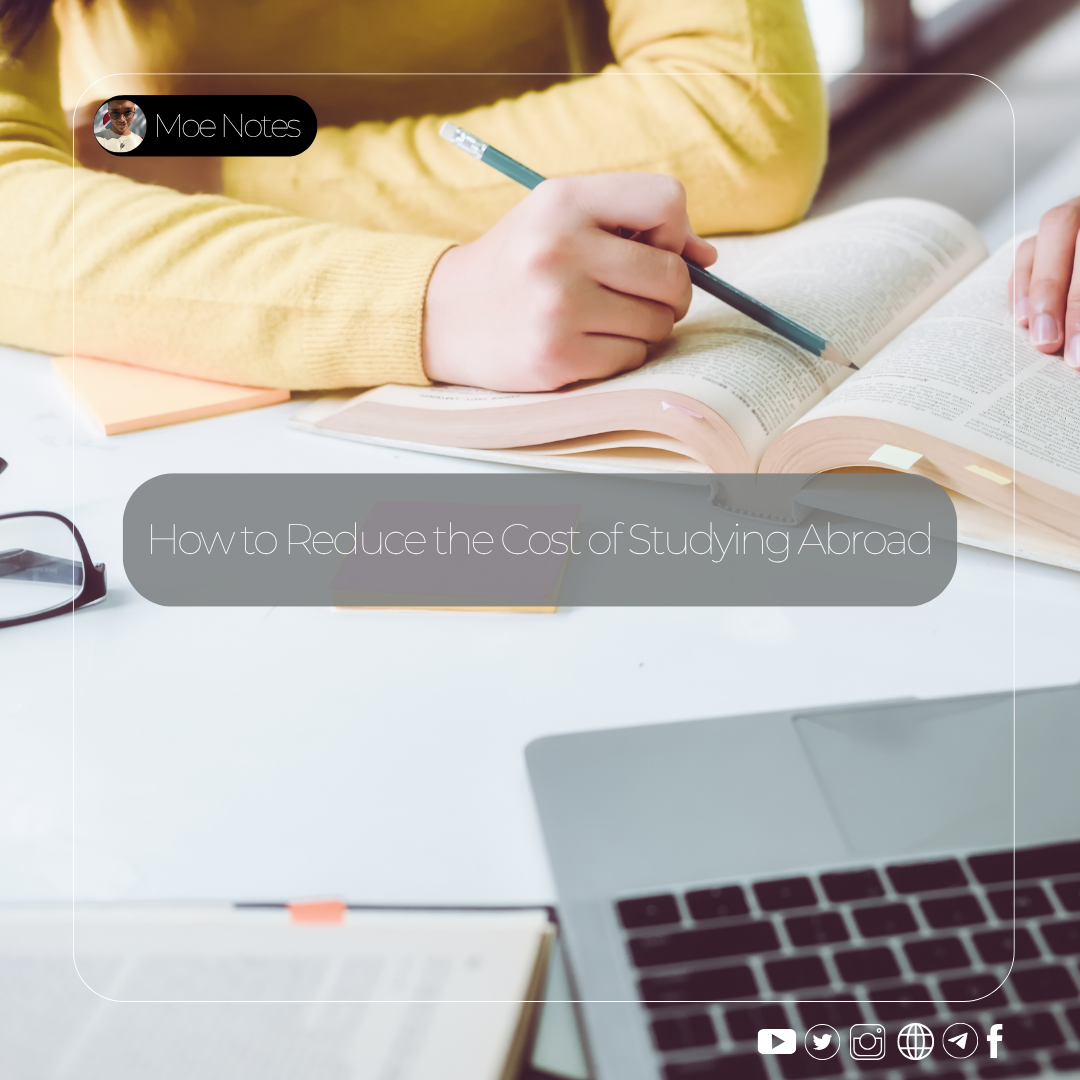How to Reduce the Cost of Studying Abroad: A Guide to the Real Trade-Offs

This atticle is also available in [Burmese]
"For those who don't want to spend a lot of time, for those who want to save money, and for those who don't have the required qualifications—the path to studying abroad becomes difficult. It's mainly about money. So, how can you reduce the costs? And what are the hidden consequences of doing so?"
The dream of studying abroad is one that every young person, rich or poor, thinks about. But when you start calculating the costs, the numbers are daunting. The traditional path—O-Levels, A-Levels, then a top university in a major country for a three or four-year Bachelor's degree—is a smooth one, but only if you have the money. Very few can afford this path without worry. This leads students to look for cheaper alternatives.
Q. Will a Scholarship Be a Viable Solution?
I have seen many posts about scholarships online. When I first read them, I thought it was something that anyone could get for a good university. However, I realized you often have to be accepted into the university before you can even apply for the scholarship, and the entry requirements for that university can be incredibly high. On top of that, other conditions made it an impossible situation for just anyone.
There are scholarships offered by countries, as well as by universities and private organizations. A scholarship is not something just anyone can get. It's an option that students who want to go abroad but don't want to spend money start to consider.
There are scholarships that are given to every student who attends, all the way up to fully-funded scholarships that cover living, food, tuition, and all other expenses. However, the better the scholarship, the lower your chances of getting it.
Things to Consider:
- If you get this scholarship, what will you have to give back in return?
- What are the scholarship's terms and conditions?
- What is the difference between a normal student and a scholarship student?
- Under what conditions can this scholarship be revoked?
- Where and how can the money from the scholarship grant be used?
What are the common Terms and Conditions? It is crucial that you do not fall below the minimum grade requirement they have set for you throughout your studies. There are often conditions about maintaining discipline and behaving well, both on and off campus.
You could be using drugs, or not following the university's rules, or not attending classes regularly. While some issues are obvious, there are also times when your scholarship can be revoked without you even realizing it. Revocation can mean you suddenly have to pay tuition fees, and if you can't, you won't be allowed to transfer.
So, even those who get a scholarship accept it only after careful consideration. And oh, remember that a scholarship is something where only a number of people you can count on your fingers are selected from a huge crowd.
Q. What About Student Loans, Financial Aid, and Bursaries?
These are grants given by a university or an organization. I haven't done it myself, so I don't know the details. However, it is extremely rare for an international student to be able to get a loan to study. It's almost non-existent.
There might be specific scholarships or schemes run by UK universities or organizations. But those depend on each individual university.
Aren't There Good, Highly-Ranked Universities in Cheaper Countries?
In nearby countries like Malaysia, Thailand, Vietnam, and Singapore, there are universities with higher rankings than the one I am currently attending in the UK. The fees are lower. The living and food costs are lower. So why didn't I choose one of those?
If I had decided to study in Thailand, for example, I would get to attend that highly-ranked university. However, the country would still be Thailand. The influence of a country is immense. No matter how good your university's ranking is, if you are in a developing country, what will you do?
The Thai standard of living, the climate and air quality, the surrounding environment, the opportunities for learning, and whether the situation encourages you to pursue your goals—all of these things become factors to consider.
In Thailand, you are not allowed to work part-time. The standard of living is not that different from Yangon. The climate and air quality are among the worst. Besides the heat, the air pollution is so bad you can't even breathe properly.
If you want to study a major like Architecture, for example, it would be difficult to go and study buildings in person in any country other than Thailand. Because you are in Thailand, to get a job, you will likely need to speak Thai.
Even if you get a job, the potential salary will be many times lower than what you could get in a developed country. In short, for me, studying in Thailand would make it difficult to fulfill my future ambitions. That's if it were me, of course.
Why are Major Countries So Expensive? Can't You Live as Cheaply as in Thailand?
Let's do a rough comparison: UK vs. Thailand.
UK
- Tuition Fee: £15,000 / year
- Living & Food Costs: ~£15,000 / year
- Cost Breakdown: A UK university that costs £15,000/year is considered an affordable one (e.g., UWE Bristol, University of Portsmouth, Oxford Brookes University). If you were a UK citizen, it would only be around £10,000. Higher-ranked universities start at £20,000 and go up from there (e.g., University of Manchester, University of Sheffield). A living budget of £15,000 a year, or £1,200 a month, is quite low compared to an expensive city like Oxford. You would have to be extremely frugal to make it work. In cheaper cities, this amount is more manageable, but you can't really go any lower.
Thailand
- Tuition Fee: £3,000 - £6,000 / year
- Living & Food Costs: £5,000 - £8,000 / year
- Cost Breakdown: The tuition fees for private universities or those ranked over 1000th (or not even in the rankings) would be lower than this. For Thailand's number one university, Chulalongkorn (ranked #229 in the world), the fees might be even higher depending on the major. Living costs vary greatly depending on the person. There are options from the cheapest to the most expensive. If you just eat at 7-Eleven and eat an average amount, it will be different from someone who orders delivery, cooks, and uses high-quality ingredients. Who can live without ordering delivery?
The Answer: If you compare them, the cost is nearly three times different. However, the ranking is not that far apart. You have to choose based on what is important to you.
What About the Local Private University Foundation Programs?
Recently, courses have been opening up that allow you to go to university abroad after a short foundation course, regardless of your previous qualifications. But later, students find that these courses don't actually lead them abroad. And if they do, the universities are not very good, and they can't get a job after graduation. If they want to change to a different university, they have to start again from the first year.
These schools charge high fees, in line with the promise of "going abroad" and "spending less time." It's not because the teaching is excellent, but because they have this accreditation, the fees are exorbitant compared to what is being taught. But no matter how expensive they are, they aren't as expensive as universities abroad, so people attend.
They accept anyone, no matter the requirement. It doesn't matter if you've just finished 10th grade or haven't even taken your IGCSEs yet. Some schools don't even require you to show anything properly, and you can go abroad right after the foundation course. The problem is, this is only suitable for someone who just wants to leave the country (and even then, if you can't get a job, you'll only be there for a short time). It's not suitable for someone who wants to go for their studies and wants to continue working with their education in the destination country.
A Final Word: Making Your Decision
All of this is a collection of possibilities, impossibilities, situations where you should invest, and situations where you must invest. It all depends on you.
In this difficult time when everyone is struggling to get out, the cost-saving measures you choose will affect your entire journey, from preparation to arrival and beyond. Please navigate this path carefully.
Expensive doesn't always mean good, and cheap doesn't always mean bad. But in most cases, you get what you pay for. Just be careful, whatever you do. And if you want to know more, you can always ask



